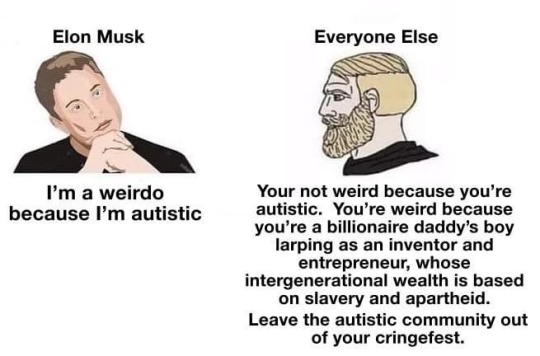Diagnosed ADHD | Inattentive ADHD | Diagnosed TBI - moral of the story: Don't get hit in the head | Executive Dysfunction is real | This is my brain dump for ADHD and any of my other neurodivergencies
Don't wanna be here? Send us removal request.
Text

Scotland has become the first country in the world to enshrine the right to free period products in law.
19K notes
·
View notes
Text
for everyone out there that experiences hyperfixation(s) or something similar, how would you describe the feeling?
please tell me about it!
#neurodivergent#adhd#actually adhd#adhd mood#adhdlife#living with adhd#hyperfixation#time to hyperfixate#hyperfixations
143 notes
·
View notes
Text
so many autistic people talk about unmasking but what about the autistic people that don’t know where “they” end and where the mask begins
1K notes
·
View notes
Text
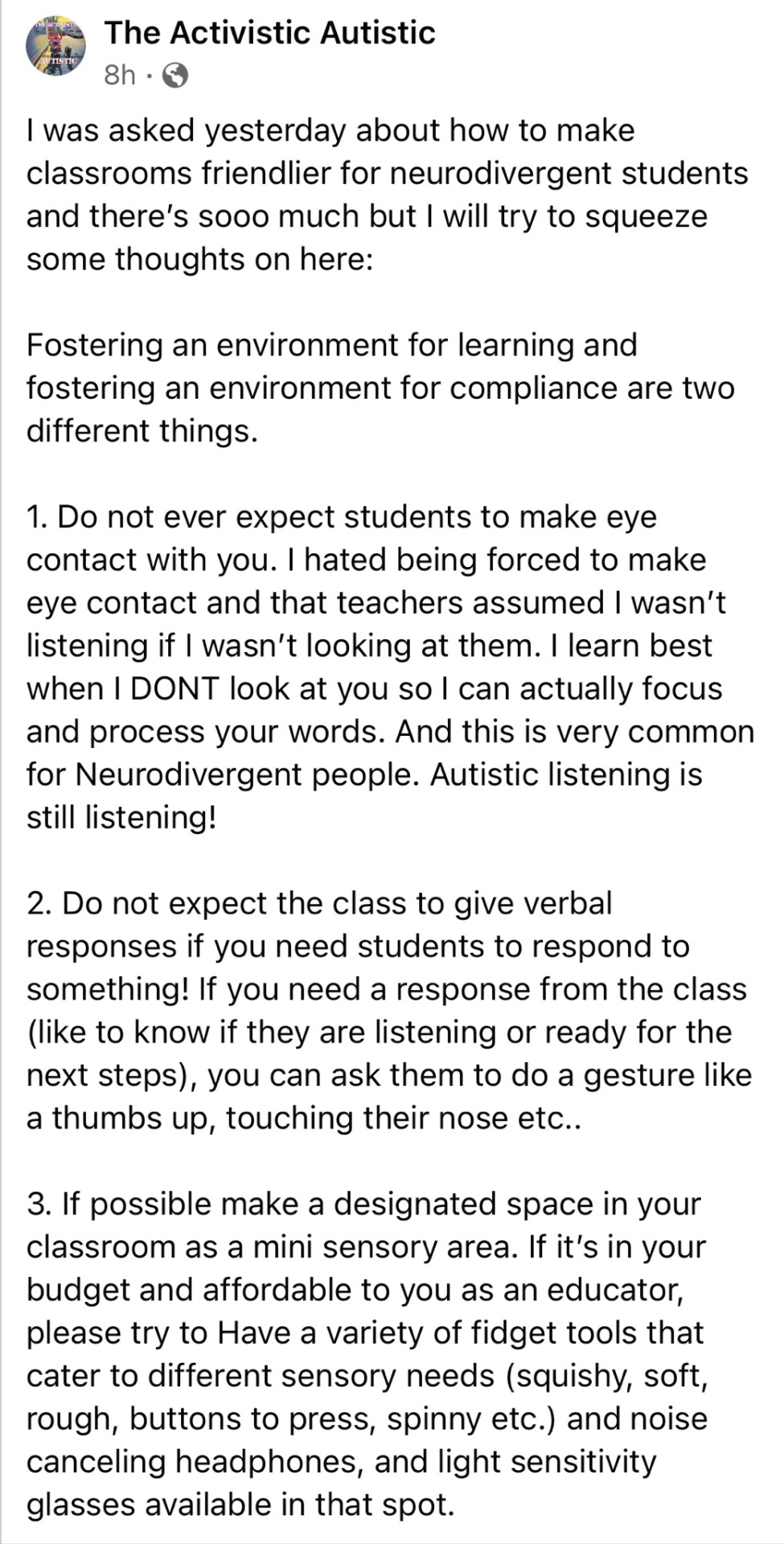
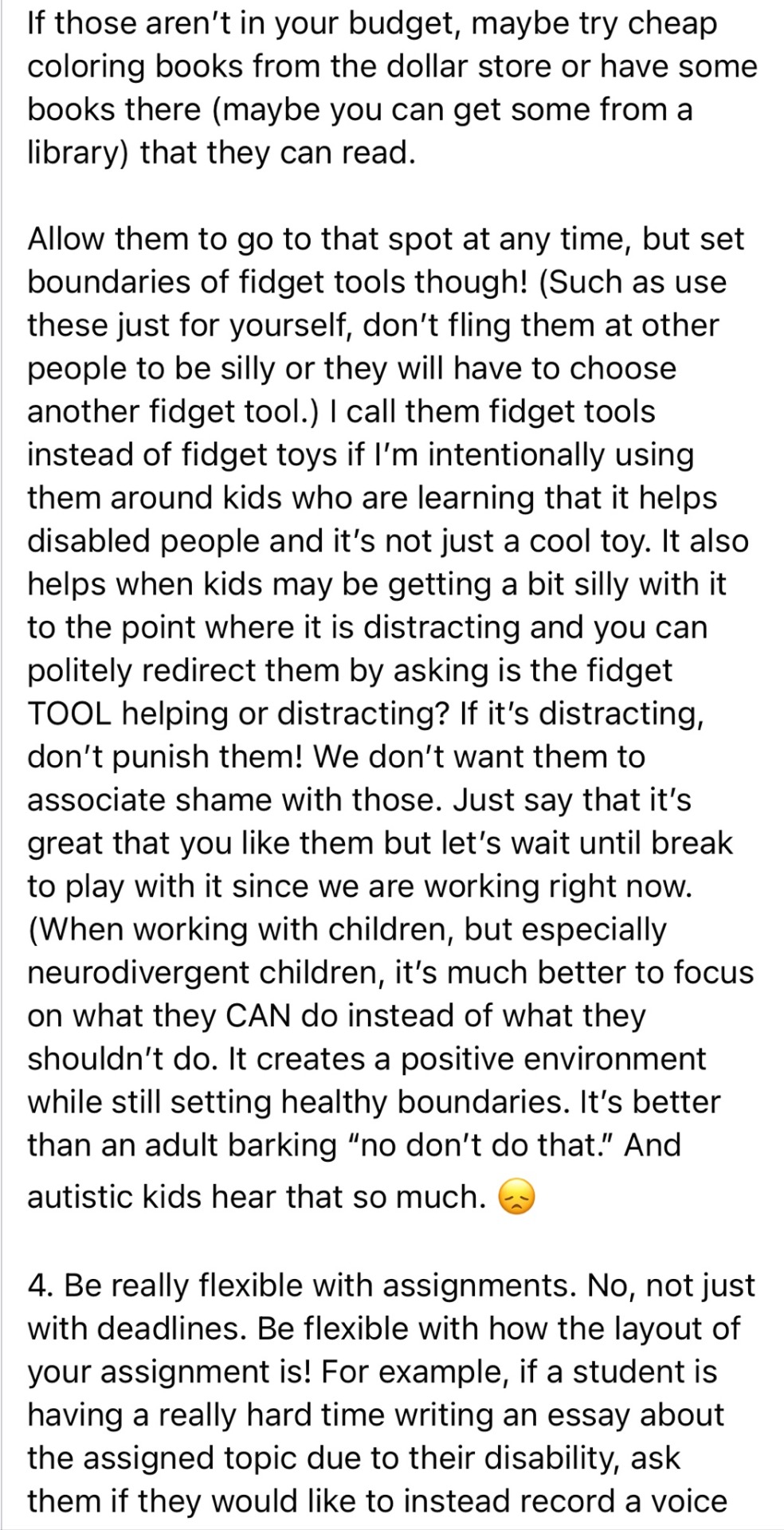
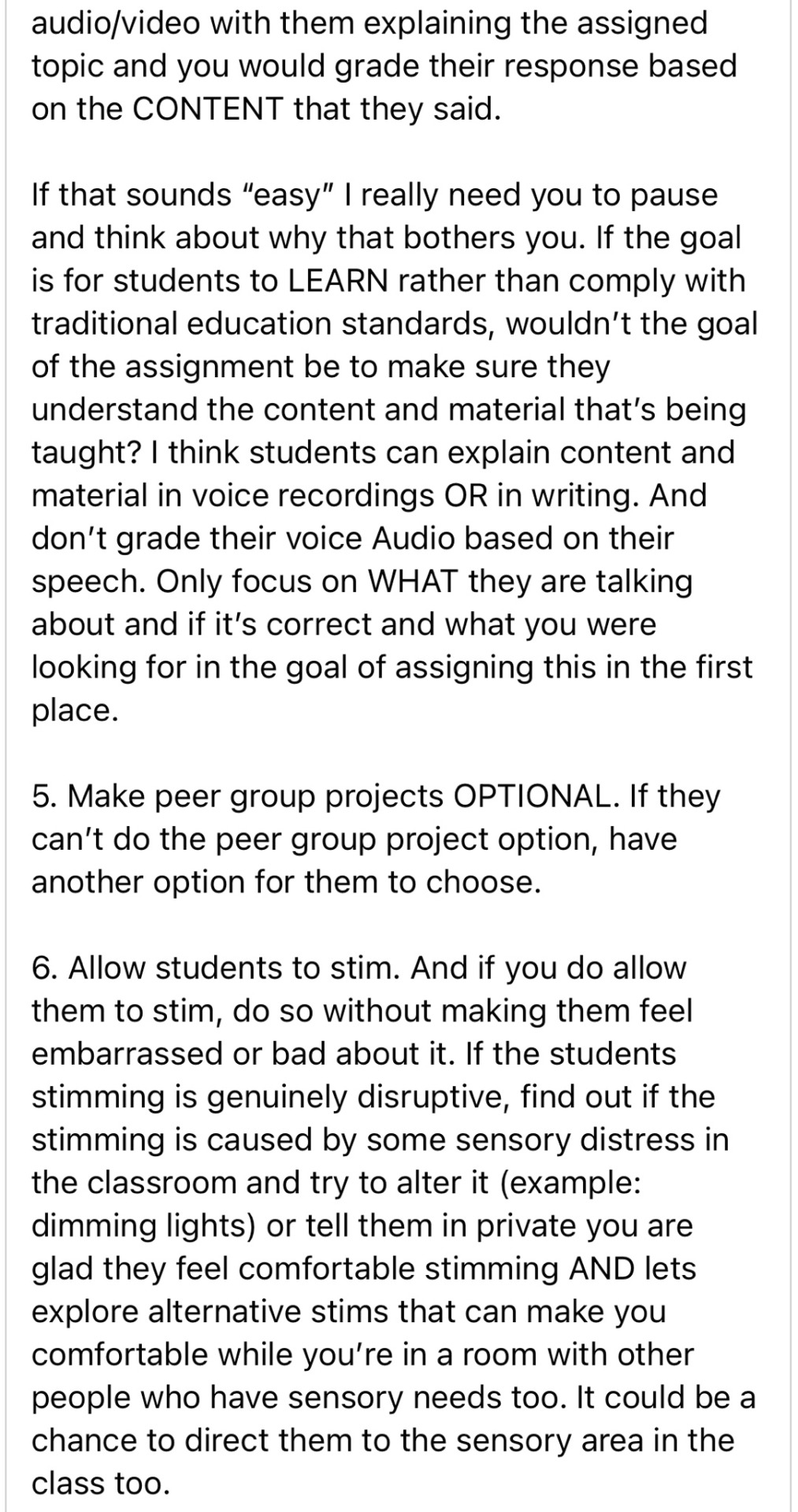
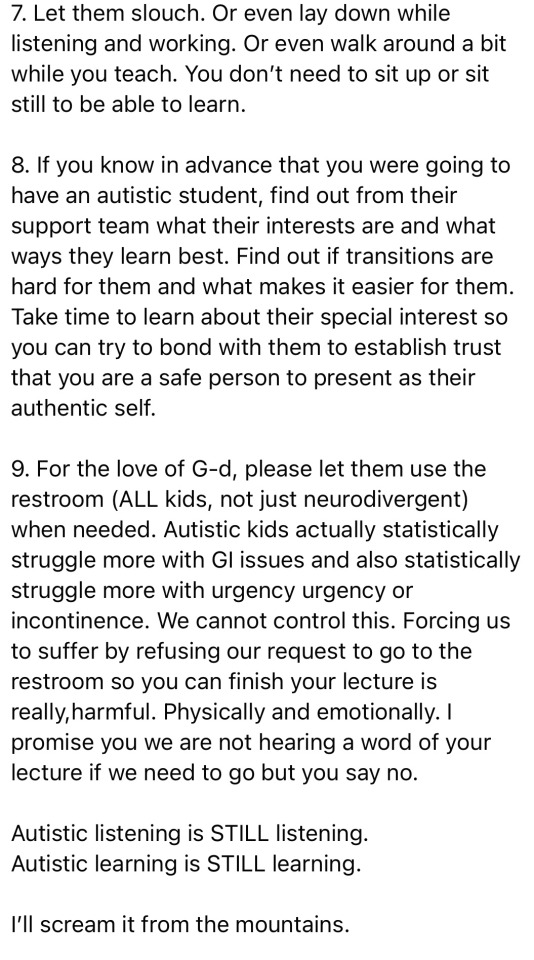
I was asked yesterday about how to make classrooms friendlier for neurodivergent students and there’s sooo much but I will try to squeeze some thoughts on here:
Fostering an environment for learning and fostering an environment for compliance are two different things. 
1. Do not ever expect students to make eye contact with you. I hated being forced to make eye contact and that teachers assumed I wasn’t listening if I wasn’t looking at them. I learn best when I DONT look at you so I can actually focus and process your words. And this is very common for Neurodivergent people. Autistic listening is still listening!
2. Do not expect the class to give verbal responses if you need students to respond to something! If you need a response from the class (like to know if they are listening or ready for the next steps), you can ask them to do a gesture like a thumbs up, touching their nose etc.. 
3. If possible make a designated space in your classroom as a mini sensory area. If it’s in your budget and affordable to you as an educator, please try to Have a variety of fidget tools that cater to different sensory needs (squishy, soft, rough, buttons to press, spinny etc.) and noise canceling headphones, and light sensitivity glasses available in that spot.
If those aren’t in your budget, maybe try cheap coloring books from the dollar store or have some books there (maybe you can get some from a library) that they can read.
Allow them to go to that spot at any time, but set boundaries of fidget tools though! (Such as use these just for yourself, don’t fling them at other people to be silly or they will have to choose another fidget tool.) I call them fidget tools instead of fidget toys if I’m intentionally using them around kids who are learning that it helps disabled people and it’s not just a cool toy. It also helps when kids may be getting a bit silly with it to the point where it is distracting and you can politely redirect them by asking is the fidget TOOL helping or distracting? If it’s distracting, don’t punish them! We don’t want them to associate shame with those. Just say that it’s great that you like them but let’s wait until break to play with it since we are working right now. (When working with children, but especially neurodivergent children, it’s much better to focus on what they CAN do instead of what they shouldn’t do. It creates a positive environment while still setting healthy boundaries. It’s better than an adult barking “no don’t do that.” And autistic kids hear that so much. 😞
4. Be really flexible with assignments. No, not just with deadlines. Be flexible with how the layout of your assignment is! For example, if a student is having a really hard time writing an essay about the assigned topic due to their disability, ask them if they would like to instead record a voice audio/video with them explaining the assigned topic and you would grade their response based on the CONTENT that they said.
If that sounds “easy” I really need you to pause and think about why that bothers you. If the goal is for students to LEARN rather than comply with traditional education standards, wouldn’t the goal of the assignment be to make sure they understand the content and material that’s being taught? I think students can explain content and material in voice recordings OR in writing. And don’t grade their voice Audio based on their speech. Only focus on WHAT they are talking about and if it’s correct and what you were looking for in the goal of assigning this in the first place.
5. Make peer group projects OPTIONAL. If they can’t do the peer group project option, have another option for them to choose.
6. Allow students to stim. And if you do allow them to stim, do so without making them feel embarrassed or bad about it. If the students stimming is genuinely disruptive, find out if the stimming is caused by some sensory distress in the classroom and try to alter it (example: dimming lights) or tell them in private you are glad they feel comfortable stimming AND lets explore alternative stims that can make you comfortable while you’re in a room with other people who have sensory needs too. It could be a chance to direct them to the sensory area in the class too.
7. Let them slouch. Or even lay down while listening and working. Or even walk around a bit while you teach. You don’t need to sit up or sit still to be able to learn.
8. If you know in advance that you were going to have an autistic student, find out from their support team what their interests are and what ways they learn best. Find out if transitions are hard for them and what makes it easier for them. Take time to learn about their special interest so you can try to bond with them to establish trust that you are a safe person to present as their authentic self.
9. For the love of G-d, please let them use the restroom (ALL kids, not just neurodivergent) when needed. Autistic kids actually statistically struggle more with GI issues and also statistically struggle more with urgency urgency or incontinence. We cannot control this. Forcing us to suffer by refusing our request to go to the restroom so you can finish your lecture is really,harmful. Physically and emotionally. I promise you we are not hearing a word of your lecture if we need to go but you say no. 
Autistic listening is STILL listening.
Autistic learning is STILL learning.
I’ll scream it from the mountains.
Via The Activist Autistic on Facebook
201 notes
·
View notes
Text
i just saw someone describe a disabled person as "someone with beautiful abilities" i cannot do this anymore
91K notes
·
View notes
Text
my favorite love language is trying, actually
205K notes
·
View notes
Text
Because I'm a bit older (late 40s) I have a different view on the whole debate about whether autism is a disability or not.
I wasn't diagnosed with autism until a year ago (and ADHD 6 months ago), but let's pretend for a moment that I had been diagnosed as a child or as a teenager. And then let's pretend that someone had asked me in my early twenties if I thought autism was a disability.
I would have absolutely denied that. I would have stepped on top of the biggest soap box I could find and shouted that autism was most certainly NOT a disability.
Because in my early twenties I was living my best life. I was married, we'd bought a house, I worked full time, I had good friends and interesting hobbies. I might be autistic, but that didn't stop me from living a perfectly normal life.
Except that it was. I just didn't realize it yet. I was constantly overstimulated without realizing it. And even when I did realize it I just pushed through it, because after all I wasn't disabled.
But your brain can only take so much chronic overstimulation before it just shuts down. I was in my mid twenties when I had my first nervous breakdown. Suddenly I couldn't do the things anymore that I wanted to.
It took me 9 months to recover from that, and that was far too fast, mostly driven by my ADHD which demanded I get my brain back online asap. So I went back to work because I was a perfectly abled young woman after all.
But I didn't change anything that had caused me such overstimulation in the first place, and thus it came back full force and after 18 months I once again reached my breaking point and had a nervous breakdown, this time with added depression.
I haven't worked again since that second breakdown over 20 years ago. I'm officially declared disabled, yet it took me another decade (!) to accept that yes, I really am disabled. The autism and ADHD was a mystery still at that point, but I had officially been diagnosed with depression, anxiety disorder and PTSD. All courtesy of me desperately trying to lead a perfectly normal life for a few years in my early twenties.
Now I know what's going on in my brain. Now I'm starting to understand what my limitations are. And now I know that yes, I really am disabled and that there are plenty of things I can't do like most people can. Certain noises scramble my brain, people exhaust me and it takes me all the energy I have to get myself through a day in one piece. I know this and I accept this.
But now, every time I see a neurodivergent someone in their late teens or their early twenties step up onto a soapbox to loudly proclaim they're not disabled, my heart aches for them because I was once where they are now.
And I hope with all my heart that they will be able to live their lives without ever breaking down, but I also know that there's a chance they'll meet their mental limits sooner or later and learn what it means to be autistic in a very confrontational and devastating way.
Because to be neurodivergent means that you have a brain that needs more attention and care than that of a NT person. You need to learn your limitations, because if you don't those limitations will catch up with you when you least expect it.
And because of that extra care that our brains need, autism is a disability, whether it affects you now or in the future or hopefully never at all.
#autism diagnosis#autistic spectrum#autistic#autism#autism awareness#autism spectrum#autistic adult#adhd
2K notes
·
View notes
Text
God, I can't tell you how much the "there's not enough enrichment in my enclosure" joke has helped my mental health. Because, for some reason I can't comprehend, pretending that I'm a zoo keeper caring for an animal (which is also me) just makes everything easier to comprehend. Like "Your head gets screwey when you're apartment is messy" just doesn't carry as much resonance as "The tiger becomes agitated when its enclosure is cluttered" because then I'll be like, no shit? The tiger? I've gotta keep things nice and clean for the tiger.
179K notes
·
View notes
Text
with adhd/autism it’s funny like. people will call you weird all your life, people will bully you for your “outlandish” behaviour, people will criticize literally everything you do as “not normal”, BUT THE SECOND YOU GET DIAGNOSED (or suggest you might have it) they’re like “huh what but you’re so normal, you’re literally the most normal person I’ve ever seen, you’re literally so normal and absolutely nothing is wrong with you? why would you have that now all of a sudden???”
108K notes
·
View notes
Text
with adhd/autism it's funny like. people will call you weird all your life, people will bully you for your "outlandish" behaviour, people will criticize literally everything you do as "not normal", BUT THE SECOND YOU GET DIAGNOSED (or suggest you might have it) they're like "huh what but you're so normal, you're literally the most normal person I've ever seen, you're literally so normal and absolutely nothing is wrong with you? why would you have that now all of a sudden???"
108K notes
·
View notes
Text
talking to other Blunt Autism bitches is so refreshing. i can just be like “im tired im going to bed gn” and theyll be like “ok cool gn” there isnt a minefield of social rules or whatever
12K notes
·
View notes
Note
Is it possible to “beat” mental illness? Or does it depend on type/circumstance?
“Beating” mental illness is actually the norm, not the exception. Most people who have a major depressive episode never have another one. 80% of people who survive their first suicide attempt never make a second attempt. 93% of Borderline Personality Disorder patients achieve remission. Up to 74% of people with Obsessive-Compulsive Disorder achieve significant clinical improvement in their symptoms, and 20% achieve full remission. Half of Generalized Anxiety Disorder patients achieve remission after the acute phase of treatment. Even disorders with relatively low rates of remission - bipolar disorder, schizophrenia, schizoid personality disorder - generally become milder and easier to manage as you age. Psychiatric symptoms tend to peak in your 20s and generally drop off as you get older, especially if you seek treatment.
This is why the narratives we use to talk about mental illness matter so much. Right now, the dominant narrative is that mental illness is “an imbalance in the brain” and that it’s largely something that people are born with. There are upsides and downsides to this. The upside is that it promotes the idea that mental illness is not the ill person’s fault, and it helps us understand that mental illness can impact anyone, regardless of their life circumstances. The downside, however, is that it’s sort of given us this idea that mental illness is inborn and unchangeable. People have taken on the idea that “that’s just how my brain is”, when the reality is that, for most people, mental illness is less of a stable trait for them, and more of just a shitty thing that they are going through for a little while. The idea that mental illness is just “in your brain” also erases the very real connection between your life circumstances and your mental health - while it’s very true that a wealthy person in a happy marriage can become depressed, it’s also very true that living in poor conditions and being in an abusive marriage can be the cause of depression, and that improving your life circumstances can lessen or eliminate mental health conditions.
If you have a mental health condition, it’s very important that you not resign yourself to the idea that you’re going to be like this forever. Chances are, you won’t. Even if you have a mental health condition that is associated with low rates of remission, it is possible to make leaps and bounds in your functioning, and to get to a point where managing your condition becomes second nature to you. Our understanding of mental illness is improving every year, and new therapies and treatments are becoming available all the time. If you seek treatment and do your best to manage your condition, you have every reason to believe that you will make huge improvements.
Hope this answers your question!
55K notes
·
View notes
Text
Things I learnt from therapy: Getting back into a hobby
Mental tips
Often we are frustrated that our skill has suffered during the inactive period. So you know you can do better - that's your talent requesting attention.
Watch progress videos, ones where somebody does a re-make of an older piece. Know that improvement in inevitable with practice.
Remember that other people can't see the planned project in your head, they only see the results. Often we lambast our work because it didn't come out how we wanted, but we fail to appreciate what we DID to. See your art for what it is, not what it could have been
Don't compare your projects to people who've had much more practice than you, or access to resources you don't have. Remember that it's not a race or a competition.
Physical tips:
Try doing it badly. It's funny, and makes you feel ok about it being bad because its purposefully bad.
Try doing your hobby without planning ahead, don't have a super defined goal and just see where it takes you.
Try a different medium, you will improve faster and also be less critical. For example, if you usually draw digitally, maybe try pixel art?
If you ever feel the tiniest inclination to do the hobby, jump on that feelings and do it now. Don't wait a second or the feeling will pass!
Do you hobby with a friend, company is great for motivation. Putting time aside specially for the hobby encourages you to work on it too.
158 notes
·
View notes
Text
It’s not really my place to say anything because I haven’t picked up a new book in an embarrassingly long time, but I keep seeing posts cross my dash bemoaning the quality of recently published books (usually about YA books or SFF) because of current trends in storytelling. And it honestly leaves me a bit confused?? Because if you don’t like the latest popular books - and I’m sincerely not trying to be flippant here - maybe don’t read them? There’s literally millions of options out there, especially if you don’t limit yourself to books published in the last 5 years. As a kid I’d go to the library and pull books out of the fantasy section until I found one that looked interesting, which meant that I was sometimes reading cheap paperbacks that were 30 years older than I was. And sure, some weren’t good, but some were absolutely fantastic. Maybe there’s some element of contemporary “book culture” that I just don’t get, and truly, if someone can explain it to me please do so. But I don’t understand why people keep reading and complaining about popular books when they could instead be reading something they actually enjoy.
43 notes
·
View notes
Note
sorry, but what's wrong with person first language?
Person first language, or referring to us as “people with autism” is generally frowned upon by the autistic community. Some of us prefer it, and that should be respected, but unless anyone have specifically asked for it we should be called autistic people.
Autism is a pervasive disorder, which means it affects everything in our lives, and how we experience the world, our selves, our relationships, and our experiences. Person first language implies that autism isn’t an intricate part of us, and is rather some hang on that can be separated from us.
It’s a well meaning but ultimately bad attempt to “see the person, not the disability”. If you have to separate us from our disability to see us as people you are abelist. We can not separate ourselves from our autism, and it’s cruel to withhold respect and love unless we do. If you want to love and respect us you got to take the whole package, autism and all.
It has the implication that we shouldn’t let our disability define us. This slogan sounds good on the surface, but it hides the expectation that we shouldn’t let it affect us and that we should function just as non-disabled people. It hides the idea that we should not talk about our disability to much, and when we do we should only tell inspiring stories about how we “overcame disability”. We are not allowed to asses if things are doable for us, or if it would be worth doing, because in their minds that would be giving up.
Therefore most of us prefer identity first language.
-Mod E
89 notes
·
View notes








